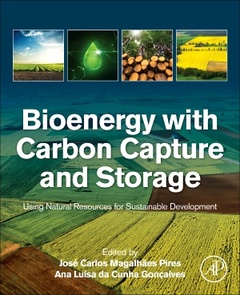Description
Bioenergy with Carbon Capture and Storage
Using Natural Resources for Sustainable Development
Coordinators: Pires José Carlos Magalhães, Cunha Goncalves Ana Luisa da
Language: English
Subjects for Bioenergy with Carbon Capture and Storage:
318 p. · 19x23.3 cm · Paperback
Description
/li>Contents
/li>Readership
/li>Biography
/li>Comment
/li>
Bioenergy with Carbon Capture and Storage: Using Natural Resources for Sustainable Development presents the technologies associated with bioenergy and CCS and its applicability as an emissions reduction tool. The book explores existing climate policies and current carbon capture and storage technologies. Sections offer an overview of several routes to use biomass and produce bioenergy through processes with low or even negative CO2 emissions. Associated technology and the results of recent research studies to improve the sustainability of the processes are described, pointing out future trends and needs. This book can be used by bioenergy engineering researchers in industry and academia and by professionals and researchers in carbon capture and storage.
1. Negative emissions technologies Francisca M. Santos, Ana L. Gonçalves, José C.M. Pires 2. Carbon capture technologies Karen N. Finney, Muhammad Akram, Maria E. Diego, Xin Yang, Mohamed Pourkashanian 3. Pre- and post-Paris views on bioenergy with carbon capture and storage Mathias Fridahl 4. Rightsizing expectations for bioenergy with carbon capture and storage towards ambitious climate goals Daniel L. Sanchez1, Peter A. Turner, Ejeong Baik, Christopher B. Field, Sally M. Benson, Katharine J. Mach 5. Status of BECCS – potential and challenges Nasim Pour 6. Role of the ocean in climate stabilization Celina M. Scott-Buechler, Charles H. Greene 7. The climate mitigation potential of managed versus unmanaged spruce and beech forests in central Europe Ernst-Detlef Schulze, Inge Stupak, Dominik Hessenmöller 8. Carbon dioxide capture and use by microalgae in photobioreactors Ihana A. Severo, Mariany C. Deprá, Leila Q. Zepka and Eduardo Jacob-Lopes 9. Beyond fractionation in the utilization of microalgal components Michele Aresta1, Angela Dibenedetto 10. Environmental impacts of bioenergy crop production and benefits of multifunctional bioenergy systems Srinivasulu Ale, Pandara V. Femeena, Sushant Mehan, Raj Cibin 11. Killing two birds with one stone: a negative emissions strategy for a soft landing of the US coal sector Piera Patrizio, Sylvain Leduc, Florian Kraxner, Sabine Fuss, Georg Kindermann, Kasparas Spokas, Elisabeth Wetterlund, Joakim Lundgren,Ping Yowargana, Michael Obersteiner 12. Bioenergy with Carbon Capture and Storage: how carbon storage and biomass resources potentials can impact the development of the BECCS Sandrine Selosse 13. Economics and policy of BECCS Nasim Pour 14. Bioenergy with carbon capture and storage in a future world Patrick Moriarty, Damon Honnery
Ana Luisa da Cunha Gonçalves graduated in Bioengineering (Biological Engineering Branch) by Faculty of Engineering of University of Porto in 2012. In 2013, she started her PhD in Chemical and Biological Engineering at FEUP. The PhD, entitled Microalgal cultivation for biomass production, CO2 capture and nutrients uptake, aimed the optimization of culturing conditions of microalgae and cyanobacteria in laboratory and pilot scale to improve both CO2 capture and nutrients uptake from the culture medium. Before finishing the PhD, she worked for 9 months as Wet Biomass Production Manager in a microalgal production company. Currently, Dr. Gonçalves is a postdoctoral researcher in the TexBoost project at CITEVE and also an external researcher at LEPABE-FEUP. AL Gonçalves published 20 papers in international peer reviewed journals, 2 book chapters and her research work was discussed in 10 international meetings.
- Presents the most recent technologies in use and future trends in research and policy
- Examines the bioenergy production and biomass processing value chains, including biorefining, negative emission technologies and the use of microalgae
- Includes techno-economic analysis and sustainability assessment of the technologies discussed, as well as an overview of the latest research results
These books may interest you

Carbon Capture and Storage 170.55 €



